
Sushi, Ramen, Okonomiyaki… Japanese food is gaining fame around the world nowadays, and Japanese food lovers are increasing every year. Japan is known for delicious food, and everyone would be surprised by its variety of restaurants in every aspect when they come to Japan for the first time.
Whether you are a tourist or not, knowing the basic Japanese restaurant phrases is not only useful for smooth ordering but also for enjoying your dining time better.
This article introduces the most useful Japanese restaurant phrases as well as tips and handy information about restaurants in Japan that would definitely help you make the most of your dining experience in Japan. Let’s start brushing up on your useful basic phrases in Japanese now!
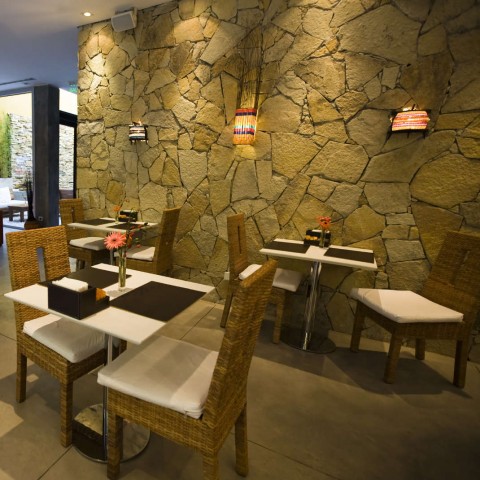
 Table of Contents
Table of Contents
- How to Look for Good Restaurants in Japan
- Booking a Restaurant
- At a Restaurant
- After Dining
- Conclusion
1. How to Look for Good Restaurants in Japan
First of all, Japanese people are avid foodies and they are quite demanding and particular about food. Not only the fact that Tokyo is the world’s most Michelin-starred city, more than Paris and New York City, but also there are a wide variety of food genres and levels of restaurants in Japan. Before learning Japanese dining phrases, let’s take a look at facts about Japanese restaurants!
1. Restaurant Variations in Japan
Before learning Japanese restaurant phrases, let’s take a look at an overview of restaurants in Japan.
Ranging from various world cuisines to Japanese food, from one-coin 牛丼 gyūdon (beef bowl) restaurants to high-class Japanese traditional restaurants such as 高級料亭 kōkyū ryōtei and 懐石料理 Kaiseki ryōri , you never run out of choices of restaurants, and you will always find any restaurants you prefer according to your budget, mood, and preferences.
Some of the most popular world cuisines in Japan and their Japanese words are listed below.
| English | Kanji | Hiragana | Reading |
| Chinese (cuisines) | 中国 / 中華 料理 | ちゅうごく/ちゅうか りょうり | Chūgoku / Chūka ryōri |
| Korean (cuisines) | 韓国料理 | かんこく りょうり | Kankoku ryōri |
| Vietnamese (cuisines) | ベトナム料理 | べとなむ りょうり | Betonamu ryōri |
| Thai (cuisines) | タイ料理 | たい りょうり | Tai ryōri |
| Indian (cuisines) | インド料理 | いんど りょうり | Indo ryōri |
| Mexican (cuisines) | メキシコ料理 | めきしこ りょうり | Mekishiko ryōri |
| French (cuisines) | フランス料理 | ふらんす りょうり | Furansu ryōri |
| Italian (cuisines) | イタリア料理 | いたりあ りょうり | Itaria ryōri |
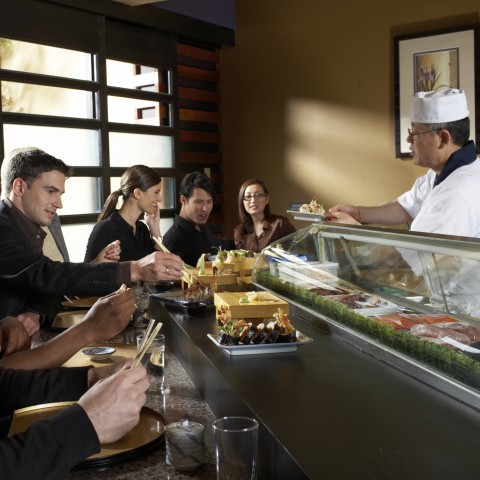
When you sit at the counter at a sushi restaurant, you can directly order your menu from the chef.
Even if you say “Japanese food” as a general category, you will not find a single restaurant in Japan that provides all kinds of Japanese food. The reason why is that Japanese restaurants in Japan are mostly specialized according to the kinds of Japanese food they serve, such as ラーメン Ramen, うどん Udon, そば Soba, お好み焼き Okonomiyaki, 焼肉 Yakiniku, 寿司 Sushi, etc.
When you look at the chart below, you will see that “Japanese food” has a wide range of characteristics such as food genre and rank.

Even for “Sushi” restaurants, there are casual “立ち食い tachigui (“standing at a counter to eat”) and “回転寿司 kaitenzushi (“Sushi go-around”)” style restaurants which are usually more reasonable, and also high class and expensive “real” Sushi restaurants prepared by trained Sushi chefs with fresh and high-quality ingredients.
Some casual restaurants, such as 牛丼 Gyūdon and ラーメン Ramen, have the 食券 shokken (“meal ticket”) system where customers have to buy a meal ticket from a ticket machine usually set in the entrance for ordering food. Although their staff services are minimal, it’s very quick and reasonable.
Please check out A Guide to the Best Traditional Japanese Foods to learn more about Japanese food!
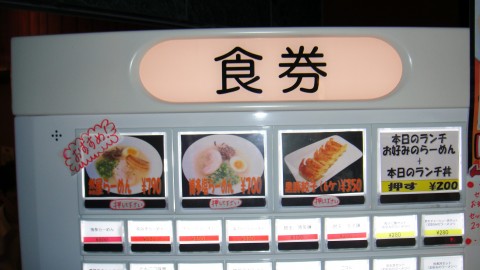
食券 shokken (“meal ticket”)
Some Japanese casual restaurants have ticket machines for ordering meals.
2. Search on the Internet / Apps
So, now you understand there is a wide range of restaurants to choose from in Japan. Then, how can you find a good restaurant that you prefer? Well, the easiest answer is the modern necessity, the Internet!
Due to such huge lists of restaurants with various characteristics in Japan, there are a lot of websites and apps that provide useful information about restaurants, and you can search by genre of food, budget, area, and keywords such as “for anniversary,” “children welcome,” “night view,” etc.
Here are some examples:
- ホットペッパーグルメ Hot Pepper Gourmet
Hot Pepper Gourmet is positioned as one of the major restaurant search websites/apps in Japan, along with Gurunavi and Taberogu. Not only can users check information about restaurants, reviews, and menus, but also search for restaurants matched with their current position and make a reservation online. Users also benefit from coupons.
- 食べログ Taberogu
Taberogu is initially a restaurant review website as its name indicates: 食べ(る) tabe(ru) “eat” + ログ rogu “log.” They have more than 130,000 subscribers and 2 billion page views a month. Taberogu is generally highly recognized as a review 口コミ kuchikomi (“word of mouth”) website for restaurants, and they evaluate restaurants based on the reviews from those who actually visited restaurants. Evaluation is updated twice a month, and a lot of people use the website as a reference for choosing a restaurant. On the website, users can make reservations and benefit from coupons.
- ぐるなび Gurunavi
Gurunavi, named after a short version of “gourmet navigation,” started as a restaurant booking website, and now the website has grown to have 56 million page views a month. They have information about over 60,000 restaurants and also provide pages for special features on seasonal or themed events. A variety of coupons are available, and not only can you reserve a table at restaurants, but you can also order delivery and takeaway.
- レッティ Retty
Retty started as a social networking service for foodies. Users can post reviews of restaurants they visited on their pages and share them with other users. Users can follow other users so that they will always have real and up-to-date reviews and information about new restaurants when following “gourmet nerds” or “super foodies.” Like other websites/apps, you can make an online restaurant reservation with Retty.
- 一休.comレストラン Ikkyu .com
Ikkyu Restaurant focuses on restaurants, but Ikkyu.com is a booking website that also provides services for booking hotels and spas. Providing high-quality services through making a reservation at selected restaurants is their main objective. They are proud that all the restaurants, hotels, and spas listed on Ikkyu.com are selected ones that passed the distinctive standard of selection. If you are looking for something nice for special occasions or high-class luxury, Ikkyu Restaurant helps you perfectly. Subscribers will benefit from exclusive plans and offers.
Even if you don’t actually make a booking with these websites/apps, just looking at them can be an interesting way for Japanese language learning with a lot of pictures!
Useful Vocabs for Searching
Here is the list of useful and essential Japanese restaurant vocabulary and keywords that you can use for your search for restaurants.
| English | Kanji | Hiragana | Reading |
| No smoking table | 禁煙席 | きんえんせき | kin’enseki |
| Smoking table | 喫煙席 | きつえんせき | kitsuenseki |
| Private room | 個室 | こしつ | koshitsu |
| OK to bring children | 子連れOK | こづれOK | kozure ōkē |
| Night view | 夜景 | やけい | yakei |
| Girls’ party/gathering | 女子会 | じょしかい | joshikai |
| For date | デート | でーと | dēto |
| Fashionable/ stylish | お洒落 | おしゃれ | oshare |
| For anniversary/special day | 記念日 | きねんび | kinenbi |
| All you can eat | 食べ放題 | たべほうだい | tabehōdai |
| All you can drink | 飲み放題 | のみほうだい | nomihōdai |

It’s easy to search nice restaurants on Apps and websites nowadays.
3. Asking For Recommendations
Gathering information online is very easy and quick. However, it’s always good to listen to real, local opinions! Following are some Japanese restaurant phrases that you can use when asking someone for recommendations.
[Japanese] この辺りでおすすめの [ イタリアン / 寿司屋 ] はどこですか。
Kono atari de osusume no [ Itarian / sushiya ] wa doko desu ka.
[English] “Which [Italian / Sushi restaurant ] is recommended around here?”
[Japanese] [Area] で一番美味しいラーメン屋はどこですか。
[ Area ] de ichi-ban oishii rāmen’ya wa doko desu ka.
[English] “Where is the most delicious Ramen restaurant in [Area]?”
[Japanese] [Area]で英語のメニューがあるカジュアルなレストランを知っていますか。
[ Area ] de Eigo no menyū ga aru kajuaru na resutoran o shitte imasu ka.
[English] “Do you know any casual restaurant with an English menu in [Area]?”
[Japanese] デートに使えるおしゃれなレストランを知っていますか。
Dēto ni tsukaeru oshare na resutoran o shitte imasu ka.
[English] “Do you know any fashionable restaurant that you can use for a date?”
[Japanese] [ name ] へ行ったことがありますか。美味しかったですか。
[ name ] e itta koto ga arimasu ka. Oishikatta desu ka.
[English] “Have you been to [name]? Was it good?”
[Japanese] ベジタリアンの友達を連れて行くのに良いレストランはどこですか。
Bejitarian no tomodachi o tsurete iku noni ii resutoran wa doko desu ka.
[English] “Where is a nice restaurant to bring my vegetarian friend?”
In order to maximize your travel experience in Japan other than restaurants, please also check Tokyo Travel Guide: See Japan’s Incredible Capital City!
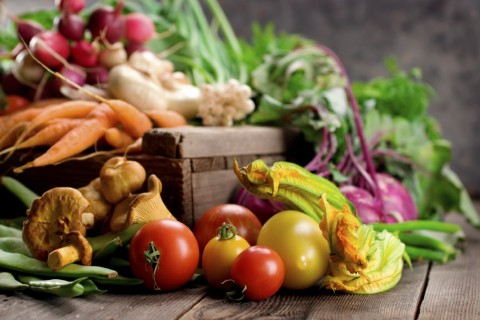
ベジタリアンレストランを知っていますか。Bejitarian resutoran o shitte imasu ka.
(“Do you know any vegetarian restaurants?”)
2. Booking a Restaurant
1. Tips for Booking
The necessity of booking depends on what type of restaurant you would like to go to. You never need a reservation at most casual restaurants in Japan. However, a reservation is recommended for an 居酒屋 Izakaya, a Japanese kind of casual dining bar, if you plan to go on Friday night so you can secure a table. (Even if you don’t have a booking and are told it’s full, there are plenty of other dining bars and restaurants in lively areas in a big city, though!)
Reservations are also recommended for popular restaurants, especially on weekends, and are probably considered reasonable etiquette for high-class restaurants.
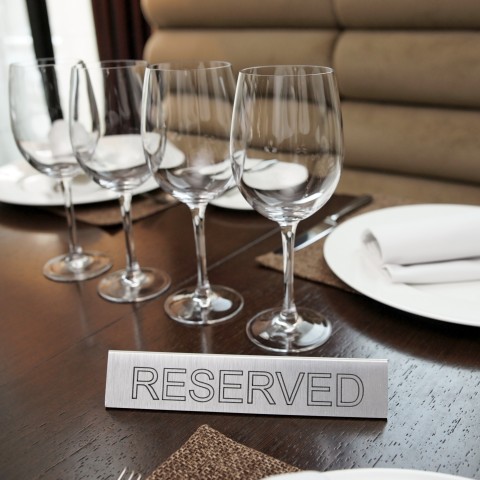
予約席 yoyakuseki (“reserved seat”)
2. Booking Phrases
The following are useful Japanese restaurant phrases when you book a table at a restaurant. Some are very basic phrases in Japanese, and you can also use them on other booking occasions such as booking train tickets, etc.
Essential vocabularies:
- 予約 よやく yoyaku (“reservation / booking”)
- 予約する よやくする yoyaku suru (“ to reserve / to make a reservation”)
[Japanese] 4月10日の夜8時に4人で予約できますか。
Shi-gatsu tōka no yoru hachi-ji ni yo-nin de yoyaku dekimasu ka.
[English] “Can I make a reservation for 4 people on the 10th of April?”
*To learn more about Japanese numbers and Japanese dates, see Japanese Numbers: Let’s Master the Basic Japanese Numbers and Japanese Calendar Dates: Reading Dates in Japanese & More.
[Japanese] 今日の夜7時頃に行きたいのですが、空いていますか。
Kyō no yoru shichi-ji goro ni ikitai no desu ga, aite imasu ka.
[English] “We’d like to come around 7pm, do you have a seat?”
*Please visit the How to Tell Time in Japanese article on JapanesePod101 to learn how to tell the time in Japanese.
[Japanese] 大人2人と子供1人です。
Otona futari to kodomo hitori desu.
[English] “We are two adults and one child.”
[Japanese] 禁煙席で窓際希望です。
Kin’enseki de madogiwa kibō desu.
[English] “We would like a non-smoking seat and by the window.”
[Japanese] 名前はOOOで、電話番号はXXXです。
Namae wa OOO de, denwa bangō wa XXX desu.
[English] “My name is OOO, and the phone number is XXX.”
[Japanese] 5月の週末で予約可能な日はいつですか。
Go-gatsu no shūmatsu de yoyaku kanō na hi wa itsu desu ka.
[English] “When are available dates for booking on weekends in May?”
[Japanese] 記念日のディナーをしたいのですが、夜景の見える席を予約できますか。
Kinenbi no dinā o shitai no desu ga, yakei no mieru seki o yoyaku dekimasu ka.
[English] “I’d like to have dinner for the anniversary, can I reserve a table with a nice night view?”
[Japanese] 6人で利用できる個室を予約できますか。
Roku-nin de riyō dekiru koshitsu o yoyaku dekimasu ka.
[English] “Can I reserve a private room that can accommodate 6 people?”
[Japanese] 予約したいのですが、子連れでも大丈夫ですか。
oyaku shitai no desu ga, kozure demo daijōbu desu ka.
[English] “I’d like to make a reservation, but are children welcome?”
[Japanese] 30人位で誕生日パーティーを行いたいのですが、貸切にできますか。
San-jū-nin kurai de tanjōbi pātī o okonaitai no desu ga, kashikiri ni dekimasu ka.
[English] “I’d like to have a birthday party with about 30 people. Can I book the whole restaurant?”

予約できますか。Yoyaku dekimasu ka. ( “Can I make a reservation?”)
3. At a Restaurant
1. Entering a Restaurant
Below is a list of Japanese restaurant phrases that will help you enter a restaurant smoothly. Some phrases are often asked by restaurant staff.
[Japanese] 予約はされていますか。
Yoyaku wa sarete imasu ka.
[English] “[staff] Do you have a reservation?”
[Japanese] 7時に3人で予約したOOOです。
Shichi-ji ni san-nin de yoyaku shita OOO desu.
[English] “I am OOO, I booked at 7 O’clock for 3.”
[Japanese] OOOの名前で予約しています。
OOO no namae de yoyaku shite imasu.
[English] “I have a reservation under the name of OOO.”
[Japanese] 何名様ですか。
Nan-mei-sama desu ka.
[English] “[staff] How many people?”
[Japanese] 4人です。
Yo-nin desu.
[English] “We are four.”
[Japanese] 8人の席を作ってもらえますか。
Hachi-nin no seki o tsukutte moraemasu ka.
[English] “Can you arrange a table for 8 people?”
[Japanese] 窓際の席は空いてますか。
Madogiwa no seki wa aite masu ka.
[English] “Is a table by the window available?”
[Japanese] 子供用の椅子を一つ用意してもらえますか。
Kodomoyō no isu o hitotsu yōi shite moraemasu ka.
[English] “Could you please prepare one child’s chair?”
[Japanese] ご案内するまで少々お待ちください。
Go-annai suru made shōshō o-machi kudasai.
[English] “[staff] Please wait for a moment, I will show you to your table shortly.”
[Japanese] こちらへどうぞ。
Kochira e dōzo.
[English] “[staff] This way, please.”

こちらへどうぞ。 Kochira e dōzo. ( “This way, please.”)
2. Ordering
Most restaurants in Japan have menus with abundant pictures next to the names of dishes, therefore, you don’t have to worry too much about whether you would ever understand what’s written on a menu. However, it’s good to communicate with a restaurant staff to tell what you want and what you don’t want, as well as get information that is not written on a menu.
These Japanese restaurant phrases below will help you order your meal smoother. Rather than just pointing at the menu and saying, “これにします I will have this,” let’s use the following Japanese dining phrases!
[Japanese] 今日のおすすめは何ですか。
Kyō no osusume wa nan desu ka.
[English] “What is today’s special?”
[Japanese] 一番人気の料理はどれですか。
Ichi-ban ninki no ryōri wa dore desu ka.
[English] “Which is the most popular dish?”
[Japanese] 英語のメニューはありますか。
Eigo no menyū wa arimasu ka.
[English] “Do you have a menu in English?”
[Japanese] ベジタリアン用の料理はありますか。
Bejitarian’yō no menyū wa arimasu ka.
[English] “Do you have dishes for vegetarians?”
[Japanese] ご注文はお決まりですか。
Go-chūmon wa o-kimari desu ka.
[English] “[staff] Have you decided what you want to order?”
[Japanese] もう少し時間をください。
Mō sukoshi jikan o kudasai.
[English] “Can I have a little more time?”
[Japanese] これに牛乳と卵は入っていますか。アレルギーがあります。
Kore ni gyūnyū to tamago wa haitte imasu ka. Arerugī ga arimasu.
[English] “Does this contain milk and egg? I have allergies.”
[Japanese] これにお肉は入っていますか。お肉は食べられません。
Kore ni o-niku wa haitte imasu ka. O-niku wa taberaremasen.
[English] “Does this contain meat? I cannot eat meat.”
[Japanese] これはどんな味ですか。
Kore wa donna aji desu ka.
[English] “What does this taste like?”
[Japanese] これは辛いですか。
Kore wa karai desu ka.
[English] “Is this spicy?”
[Japanese] 辛いのは苦手です。唐辛子が入っていない料理はありますか。
Karai no wa nigate desu. Tōgarashi ga haitte inai ryōri wa arimasu ka.
[English] “I’m not good at spicy food. Are there dishes that do not contain chili peppers?”
[Japanese] これとこれにします。
Kore to kore ni shimasu.
[English] “I will have this and this (by pointing on a menu).”
[Japanese] Bランチセットをお願いします。
B ranchi setto o onegai shimasu.
[English] “I would like a B Lunch Set.”
[Japanese] とんかつ定食と温かいお茶をください。
Tonkatsu teishoku to atatakai o-cha o kudasai.
[English] “I would like a Tonkatsu teishoku set and hot tea, please.”
[Japanese] 本日のスープとフィレステーキのミディアムレアをお願いします。
Honjitsu no sūpu to fire sutēki no midiamu rea o onegai shimasu.
[English] “I would like today’s soup and a medium-rare filet steak, please.”
[Japanese] セットのドリンクはアイスティーをお願いします。
Setto no dorinku wa aisu tī o onegai shimasu.
[English] “I would like iced tea for the drink in the set.”
*You can choose either hot or cold (iced) coffee and tea at most restaurants in Japan.
[Japanese] ワイン/ 飲み物 のメニューはありますか。
Wain / nomimono no menyū wa arimasu ka.
[English] “Do you have a wine list / drink menu?”
[Japanese] 生ビールをください。
Namabīru o kudasai.
[English] “I’d like draft beer, please.”
[Japanese] 食後にホットコーヒーをお願いします。
Shokugo ni hotto kōhī o onegai shimasu.
[English] “I would like hot coffee after a meal.”
[Japanese] いただきます
Itadakimasu.
[English] “(Japanese greeting phrase before eating) Thankfully I have a meal.”
* In order to learn more about Japanese untranslatable phrases and words, please check Japanese Untranslatable Words: Let’s Talk like a Native!
[Japanese] デザートのご注文はございますか。
Dezāto no go-chūmon wa gozaimasu ka.
[English] “[staff] Would you like to order desserts?”
For more about Japanese words for English speakers and Japanese nouns related to food and restaurants, see our Food – Utensils & Tableware and Restaurant vocabulary lists.

ご注文はお決まりですか。 Go-chūmon wa o-kimari desu ka.
(“Have you decided what you want to order?”)
3. Requesting
[Japanese] すみません、お水 / ナプキンをもらえますか。
Sumimasen, o-mizu / napukin o moraemasu ka.
[English] “ Excuse me, can I have water / napkins?”
[Japanese] 小さい取り皿とスプーンをお願いします。
Chiisai torizara to supūn o onegai shimasu.
[English] “Can you bring me a small plate and a spoon, please?”
[Japanese] お箸をもう一膳もらえますか。
O-hashi o mō ichi-zen morae masu ka.
[English] “Can I have one more set of chopsticks?”
[Japanese] 同じグラスワインをもう一杯ください。
Onaji gurasu wain o mō ippai kudasai.
[English] “I would like another glass of the same wine.”
[Japanese] デザートのメニューをもらえますか。
Dezāto no menyū o morae masu ka.
[English] “Can I have a dessert menu, please?”
[Japanese] ティラミスとカフェラテホットをお願いします。
Tiramisu to kaferate hotto o onegai shimasu.
[English] “I would like Tiramisu and a hot caffe latte.”
[Japanese] お手洗い/化粧室はどこですか。
O-tearai / keshōshitsu wa doko desu ka.
[English] “Where is a wash / powder room? ”
* The word “化粧室 keshōshitsu (“powder room”)” is the more polite expression to use but it’s usually used by women.

すみません、お水をもらえますか。
Sumimasen, o-mizu o moraemasu ka. (“ Excuse me, can I have water?”)
4. After Dining
Apart from learning essential Japanese phrases for restaurants, here is information you need to know for after dining!
1. Etiquettes and Tips
- After eating everything, you can ask for hot (green) tea FOR FREE at Japanese restaurants, especially at Sushi and Teishoku restaurants, etc.
- No Tip Needed: You never need to leave a tip in restaurants in Japan! If you leave money on your table, staff would run after you to tell you “you forgot your money”.
- Pay at a Cashier (not at the table): Unlike most restaurants in western culture, customers usually pay at a cashier at the entrance of a restaurant in Japan. After telling a waiter “Check, please”, he/she brings your bill to your table, but you need to take it to a cashier to pay.
- Though most casual restaurants allow customers to take leftovers home by offering a container, some restaurants refuse to do so due to hygiene and safety reasons.
If you want to learn more about Japanese etiquette, please visit Japanese Etiquette and Manners!
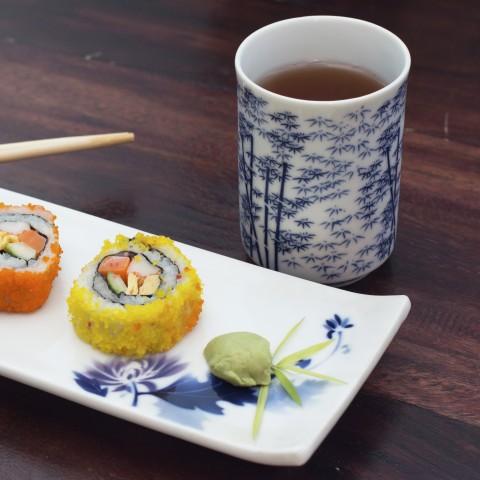
温かいお茶をもらえますか。 Atatakai o-cha o moraemasu ka. (”Can I have hot tea?”)
2. Useful Phrases after Eating
Here are some useful Japanese restaurant phrases after finishing your meal.
[Japanese] ごちそうさまでした。
Gochisō-sama deshita.
[English] “ (Japanese greeting phrase after eating) Thank you for good food.”
[Japanese] とても美味しかったです。
Totemo oishikatta desu.
[English] “It was very delicious.”
[Japanese] 持ち帰りにできますか。
Mochikaeri ni dekimasu ka.
[English] “Can I take this home?”
[Japanese] 残った料理用に持ち帰り容器をもらえますか。
Nokotta ryōriyō ni mochikaeri yōki o moraemasu ka.
[English] “Can I have a container for leftovers?”
[Japanese] お会計お願いします。
O-kaikei onegai shimasu.
[English] “Check, please.”
[Japanese] 現金/カードで払います。
Genkin / kādo de haraimasu.
[English] “I will pay by cash /card.”
[Japanese] VISAカードは使えますか。
Biza kādo wa tsukaemasu ka.
[English] “Can I use a VISA card? ”
[Japanese] 決済アプリは使えますか。
Kessai apuri wa tsukaemasu ka.
[English] “Can I use a payment application?”
*In Japan, payment applications such as LINE Pay, PayPay, Rakuten Pay, Amazon Pay, Apple Pay etc. are popular alternatives to cash or credit.
[Japanese] 別々に払えますか。
Betsu-betsu ni harae masu ka.
[English] “Can we pay separately? ”
[Japanese] 私が全部払います。
Watashi ga zenbu haraimasu.
[English] “I will pay for everything.”
[Japanese] 美味しかったです。また来ます。
Oishikatta desu. Mata kimasu.
[English] “It was good, I (we) will come back again. ”

カードで払います。Kādo de haraimasu. (“I will pay by card.”)
5. Conclusion
In this article, we introduced the most useful Japanese Restaurant Phrases by situation as well as restaurant tips and information, including:
- Restaurant Variations in Japan
- Useful Restaurant Search Websites/Apps
- Phrase for Asking for Recommendations
- Tips for Booking
- Booking Phrases
- Phrases for Entering a Restaurant
- Phrases for Ordering
- Phrases for Requesting
- Etiquette and Tips after Dining
- Phrases after Dining
With these Japanese restaurant phrases and information, you’ll be able to maximize your dining experience in Japan along with delicious food!
If you would like to learn more about Japanese words for English speakers, you’ll find a lot more helpful content on JapanesePod101.com. This is the best place to learn Japanese online, providing a variety of free lessons designed to help you improve your Japanese-language skills.
If you are interested in more Japanese phrases by situations, the following articles are just right for you:
- Japanese Travel Phrases for an Enjoyable Trip to Japan
- Giving and Asking for Directions: “Right” in Japanese & More
- The Most Useful Japanese Phone Phrases
And there’s so much more! Be a faster learner and enjoy studying Japanese at JapanesePod101.com!
Before you go, let us know in the comments if there are any specific topics or situations you’d like to learn Japanese phrases for. We’d be glad to help, and we look forward to hearing from you!










